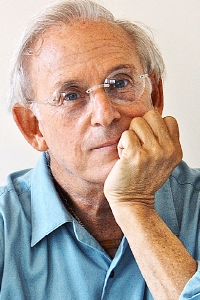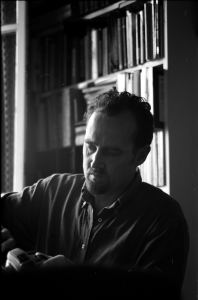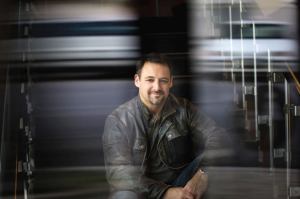Interview with Charles Salzberg (author of Swann’s Lake of Despair)
 Charles Salzberg (author of Swann’s Lake of Despair) is the author we are interviewing today on Thriller Books Journal; enjoy our interesting conversation.
Charles Salzberg (author of Swann’s Lake of Despair) is the author we are interviewing today on Thriller Books Journal; enjoy our interesting conversation.
[Q]: Hi Charles, welcome to Thrillerbooksjournal.com. Our first question is very easy: who is Charles Salzberg as a person and as a writer?
[A]: Ha! You start off with the toughest possible question to answer. But in a way, who I am and who I am as a writer are inextricably connected. Most people would probably rattle off a resume that is really what they’ve done, not who they are. Instead, I’ll rattle off a resume of who I think I am as a person. Kind, perceptive, gentle, helpful, sensitive, interesting, no, make that fascinating, knowledgeable—to a degree—and moderately talented. But, of course, that’s a biased view. I suppose if you really want to know who I am you’d have to grab a bunch of people who know me and ask them. I’d hope you’d get pretty much what I’ve just written, but I can’t swear to that.
Writing is what I do and to a certain extent who I am. When I began writing, I thought of myself as a “literary” writer, in the vein of Saul Bellow, Philip Roth and Vladimir Nabokov. But it’s dangerous, I think, to compare oneself to anyone. Certainly, all these writers influenced me, but eventually I realized I would just write what I felt like writing and see where I landed. And somehow I wound up writing about crime. But not, I think, in the usual way. I don’t really write murder mysteries, although I have written about murder in a book like Devil in the Hole. And my Swann novels, except for the first one, Swann’s Last Song, don’t have a single murder in them. In fact, there’s very little violence at all. I’m much more interested in human behavior. How people react under circumstances, how they relate to others and themselves, how we are so alike and yet so different.
So, the short answer to both questions is, to paraphrase Popeye, “I yam who I yam, and I writes what I writes.”
[Q]: Where did you get the idea for Swann’s Lake of Despair?
[A]: Swann’s Lake of Despair began with a call from a friend, Kaylie Jones, who was editing a collection of stories for Long Island Noir. She asked if I had a short story that took place in Long Island and had a nourish feel to it. I didn’t, but as a long time freelance writer I’ve learned never to say no, so I took Henry Swann and placed him in Long Beach, the only Long Island town I knew anything about. The result was a short story called A Star Burns Bright, which was published in that anthology. The story seemed too good to waste, so I figured I could use it as the first chapter of the third in the Henry Swann series. I decided to have Swann work three cases at once, a bit of a challenge for me, so I had to come up with two other ideas. For one, I raided the life of one of my students, Julia Scully, an 80-year old woman who’d worked in the world of photography for most of her life. She was working on a memoir about this period in her life (she’d already had one terrific memoir published, Outside Passage, to wide acclaim) and I saw a great opportunity for a Swann mystery to solve. I got her permission, of course, and so Swann winds up looking for a bunch of valuable lost photographs and negatives. For the third story, I came up with the idea of a young man who goes to his girlfriend’s apartment and finds that not only is she not there but all her possessions are gone, too.
So you can see, I get my ideas either out of thin air or something I’ve heard that appeals to my sense of mystery. That’s why crime writing is so much fun—there’s always something to write about.
[Q]: Can you briefly summarize it (without telling us too much, of course)?
[A]: Swann is hired to find a lost journal that may or may not shed light on the mysterious death of a young woman in the 1930s, the real life Starr Faithfull, who fell, was pushed, or jumped from a yacht off the coast of Long Beach, Long Island. At the same time, he’s hired to find a cache of lost photographs and negatives taken by the real-life Eddie Feingersh, a daredevil photojournalist in the 1950s; he’s also hired by a distraught young man whose girlfriend seems to have disappeared into thin air. These cases take him to Florida, Texas and New Jersey in search of the answers.
[Q]: Why readers might like it? Is there anything they might find difficult to accept in the book?
[A]: I hope people like the book because they like Henry Swann. He’s a down and out skiptracer who has reluctantly partnered up with Goldblatt, a slovenly, disbarred attorney who seems to have a variety of talents and contacts. Their interaction, their love-hate relationship, provides me an opportunity to inject some humor into the series. Swann is a cynic, but an educated one—he quotes poetry and prose when the occasion arises. He’s also very good at finding people and finding a place in world’s he’s unaccustomed with—in Swann’s Last Song, it was the world of stolen antiquities, in Swann Dives In it was the world of rare books, in Swann’s Lake of Despair it’s the world of collectible photography.
I hope there’s nothing difficult to accept in any of my books. I do the research and try to make everything fit, and since the mysteries are really rather commonplace—no one ever gets murdered—I think the scenarios are all ones that are familiar to all of us. After all, who hasn’t had their heart broken? Who hasn’t wished to look for valuable treasure?
[Q]: How Henry Swann character has changed since his first appearance in Swann’s Last Song?
[A]: Swann’s Last Song was meant to be a stand-alone. I had no intention of ever writing another Swann novel, but to my surprise it was nominated for a Shamus Award for Best First PI Novel. I lost and got so pissed off I decided I’d keep writing them until I won something or I ran out of catchy Swann titles (I’m getting close). So, if you want me to stop you’d better give me some damn award.
If anything, Swann has gotten even more world-weary, sarcastic and cynical, but I think (and hope) this makes him more entertaining and maybe even, to those world-weary, sarcastic cynics in the world more relatable. Like most of us, he’s looking for meaning to his life—which seems to elude him. But in each book he gets a little older, which means he either gets a little wiser or realizes how clueless he really is.
[Q]: Are you already working on a new book?
[A]: Yes. I’m working on the fourth Swann book. It’s called Swann’s Way Out and it begins with Swann having something of a mid-life crisis. Sound familiar to anyone out there?
[Q]: What’s your opinion regarding ebooks and traditional books?
[A]: I love traditional books and I hope they never disappear, but I also think ebooks have their place. They make books available to people who can’t afford to spend twenty or twenty-five dollars for a hardcover and fifteen to twenty for a paperback. They also allow you to carry around ten, twenty a hundred books or more with you and choose from them. In fact, I think ebooks broaden the number of potential readers, because not only can you read on a Kindle or an iPad, but you can even read on your phone.
[Q]: A suggestion to wannabe writers. A suggestion to passionate readers.
[A]: Write. Write. Write. Don’t let anything anyone says about your writing deter you. And then, don’t be afraid to send things out. You’re going to get rejections, everyone does, I still do, but don’t let that stop you.
Read, read, read. And don’t be afraid to contact your favorite author with praise or questions or suggestions. We like to know that someone out there is actually reading what we’ve written. Obviously, I like having someone say they love what I’ve written, but after the initial sting I don’t even mind if someone has constructive criticism. With my last book, Devil in the Hole, I was browsing through the reviews on Goodreads and I came across one that made me laugh. All he wrote was, “I don’t know what all the fuss is about.” I never do this, because usually nothing good can come of it, but this so amused me that I wrote back, “I don’t know what all the fuss is about either, but I’m sure glad there is a fuss.” I got back this lovely, apologetic note that began, “Wow, I can’t believe you wrote back…” and continued with an apologia saying that he’d expected a different kind of novel. But that was fine with me—at least I knew he read what I’d written.
[Q]: If you want to say anything, this is the moment…
[A]: I’m speechless.
[Q]: Would you like to say hello to our readers?
[A]: I’d love to say hello to your readers and I hope they read and enjoy what I write.
[Q]: Thanks for having accepted our invitation: it’s been a pleasure having you.
[A]: Ditto.







I’m excited to see Swann again, Charles! I suspect your readers will hope that that thing that has to happen before you stop writing this series…never does